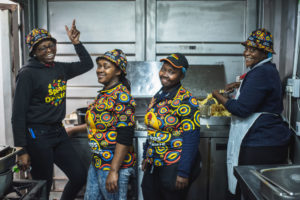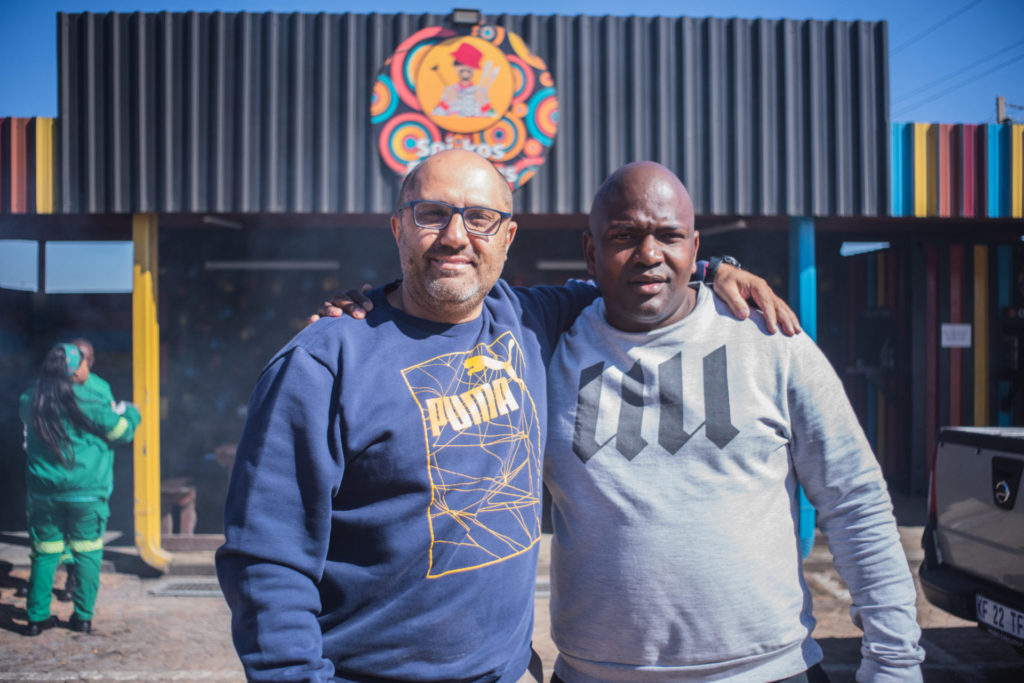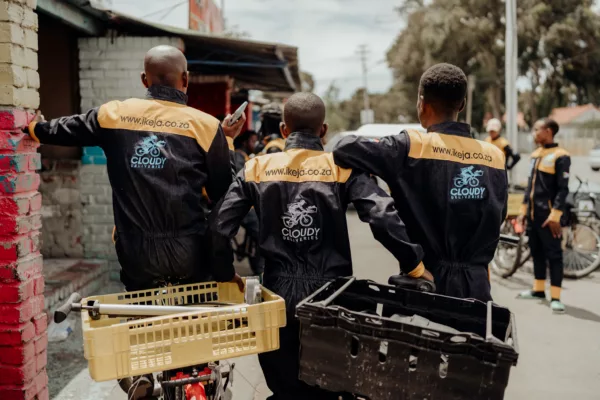Arriving on Xhosa Street in Tsakane, a township located in the City of Ekurhuleni, Johannesburg, one is greeted by the familiar texture of township life: People milling about, music blaring from some corner or the other, and taxis driving by, stopping every so often to either pick up or drop off passengers. It’s an abnormally windy day in July, which means that the dust from the untarred sections of the ‘hood creeps up in the air every now and then. This is where Spi-kos Delicious is located. The bright, multi-coloured container housing this fine establishment which specialises in chicken is located. I’m here to meet with the owner, Paul Mendonca and Sipho Nkosi. Paul is the first to arrive, and finds me already waiting, eager to discover more about how the store, which has other branches at other sections of the hood, was founded.

“I actually own a chicken business, and Sipho was already one of my customers there,” says Paul as we settle down to chat in the converted backroom office which was once someone’s house. “He already had a similar [chicken dust] concept in Kwa-Thema, and he was one of my biggest customers. During the COVID period, we thought this is the perfect time because the gap [was] there, [and] I’d always wanted to do something in the township, and I needed somebody that I can do it with, and he needed somebody that’s had experience in a bit of franchising and distribution. We both wanted the same thing, and the synergy that Sipho brings — he brings a lot of strengths with him, and I also bring some strengths with me.”
The store was up and running in 2020, right in the middle of the hard lockdowns which crippled many businesses, forcing a sizable number of them to shut down. Paul lost ninety percent of his business, and Spi-kos Delicious, a name Sipho coined, inspired partly by the comedian and Kwaito artist Tshepo Mogale’s alter-ego, came up with. “The restaurants [that I supply] were all closed. It was very, very hard. We needed to look for alternatives and new ideas, and this is something that we had spoken about. When COVID happened, it forced us to do it. It was the best thing,” says Paul while the sound of Amapiano sips through the walls and gets the mood going. Outside, the meat is already getting braai’d, and the rest of the staff has set up for the day ahead. Customers, too, are streaming in slowly but steadily.

Sipho walks in, greets, and settles down. “I thought you’re coming with a whole TV crew,” he jokes. Paul teases him about the way he’s dressed — in a pair of jeans and an Unknown Union jumper, which he got while operating a since-closed business in Maboneng. The chicken with chips meal I’d ordered also arrive, and the conversation proceeds. Sipho provides further background to the business idea. “We started off looking for sites and all that stuff. Six months later, we found an old site, which was chicken dust [as well]. But it was not doing well. [The owners] wanted someone who’s going to buy the business from them. I went to Paul, I told them about the guys’ proposal. Because the place was not doing good, we negotiated a deal with the guys,” he says.
They ended up buying what is now a burgeoning brand for R13, 500. Paul then whips out his phone and shows me how the current store used to look. It’s nothing compared to what exists at present. Sipho is the one who found a graphic designer to make a logo for the business, a process that took five months in total. He says that Paul’s other struggle was that the businesses he was supplying at the time were demanding that he sells chickens to them at a highly reduced cost.

He told Paul: “Maybe you can develop your own [client base], where you can the way you want to charge.” Sipho’s equipment from the Maboneng store got transferred to where we are now.
“I remember our first day’s turnover at that store. The guy who used to own the business before us used to sell two chickens a day. We sold about six to ten chickens on our fist day. And now, on a Friday or Saturday, we’re doing about two hundred chickens per store,” says Paul, referring to the network of four Spi-kos stores which have mushroomed in various sections of Kwa-Thema and Tsakane over time, which employ nine people per store, on average.

I asked about the practicalities of running the stores, such as how the logistical problem of delivery is handled.
“We deliver daily, normally any time between 9 in the morning, and 3 in the afternoon. Every day, there are fresh chickens that get delivered, that have already been prepared by us at our factory. We deliver everything from the packaging to the sauces that have been specially developed for us. We really got an awesome product.”
And he is not lying. The chicken tastes pristine, and the slaap chips are top-of-the-range. It’s great value for money, overall. || “We want to take this idea to a whole other level. Nobody does things in the township like we do. We invest a lot of money here. The township is the last opportunity that people think about when it comes to a business. People want to be in shopping centres. Why must it be the norm,” says Paul as we wind down. || I ask about how the partnership with Ikeja is benefiting them. Sipho responds by saying that they were initially sceptical but can see the benefit now. “After they had set the Wi-Fi up, it worked very well. I was like, ‘wow, this thing, anyone can use it in the township.’ It just needs people to be aware of it. I’m using it right now,” says Sipho in conclusion.
Paul drives me around to other Spi-kos branches following our conversation. Each one stands out, irrespective of where it’s located. I take an Uber on my way back, and the driver wonders what brought me to the East side of town. After hearing what I have to say, he responds: “They started small. We believe in them.”

Follow your nearest Spi-Kos Delicious outlet on Facebook.



